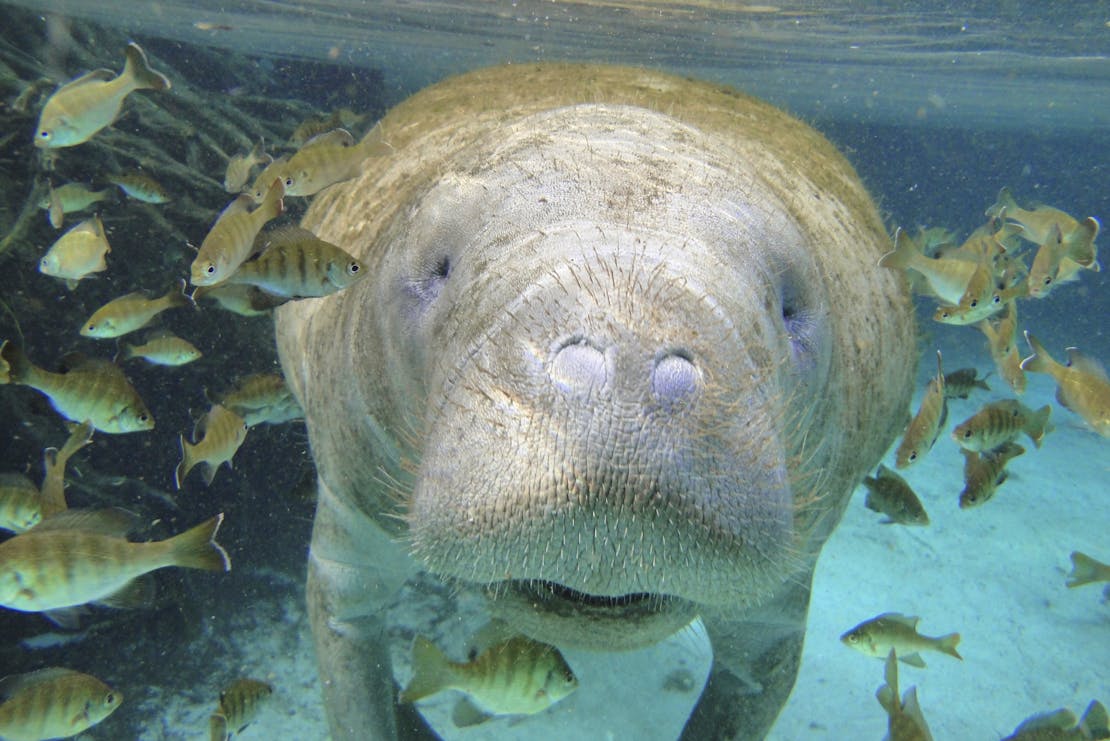Defenders has been working tirelessly to help save manatees and their habitat while addressing the current mortality crisis. Minimizing deaths over the winter will be the first major step to ensuring the Florida manatee population does not continue to decline. In early December, the U.S. Fish and Wildlife Service and Florida Fish and Wildlife Conservation Commission announced the launch of a feeding program for malnourished manatees in the Indian River Lagoon (read more here). Reestablishing healthy habitats that provide natural warm water refuge and food, such as by restoring the seagrass meadows in the Indian River Lagoon and important habitats within the Ocklawaha River and its springs, are important long-term solutions for which actions need to be taken now. And in late December, Defenders of Wildlife joined two other conservation groups to issue a formal notice of intent to sue the Environmental Protection Agency for failing to protect manatees from water pollution in Florida (read more here). Defenders is supporting efforts to help manatees endure the food shortage without further mass population loss, while we continue the fight for restoration of the Indian River Lagoon’s seagrass beds and the overall heath and abundance of manatee habitats across Florida.
Manatees are experiencing an unprecedented mortality crisis and they urgently need our help. We have already lost more than 980 manatees in Florida this year alone, representing over 10% of the estimated total population and shattering the previous record of 830 deaths, set in 2013. Yet, while the Florida manatee is in peril, there is hope if all parties come together and commit to the necessary short- and long-term actions needed to address the challenges facing Florida’s manatees and protect this species.
Unusual Suspects
Manatees need healthy food sources near warm water areas to survive during cold weather. During the winter, manatees can suffer from cold stress—a sometimes fatal condition they experience in water below 68 degrees Fahrenheit—forcing them to take refuge in warm water areas around the state. Over the past five decades, due to habitat loss, more than 60% of the manatee population has learned to depend on warm-water outfalls at electric power plants to survive cold winter days—an unsustainable situation.
With more than 21.5 million residents and growing, Florida is the third most populous state in the country. In recent years, a combination of agricultural, residential and industrial runoff—exacerbated by lax enforcement of water quality laws and waning oversight of land development—has fueled algal blooms that have killed tens of thousands of acres of seagrass, the manatee’s primary food source. This seagrass loss has led to hundreds of manatees starving to death as they seek food in their warm water shelters during the winter months. Even when water temperatures rise with spring’s arrival, many emaciated manatees continue to suffer from—and succumb to—malnutrition.
As a result of this rapid decline, the National Oceanic and Atmospheric Administration (NOAA) declared an Unusual Mortality Event (UME) along Florida’s Atlantic coast from the Indian River Lagoon to the Keys. While there have been other UMEs, this is the first time the major cause of manatee deaths is starvation, with long-lasting effects on the population likely.
Many of these manatee deaths are human-driven, but preventable. Given the loss of so much seagrass, agencies and partners must prepare to rescue and treat sick manatees into the foreseeable future, while making measurable progress to protect and restore manatee habitat for the long term.
In September, over 40,000 members and supporters of Defenders of Wildlife signed a petition to the U.S. Fish and Wildlife Service (FWS), urging FWS to “prioritize safeguarding and securing manatee habitat to prevent further unprecedented loss of manatees.” The petition underscores how it will take bold and effective action to uphold conservation gains achieved over the last few decades.
Saving Manatees
One of Defenders’ key efforts to defend the manatee is advocacy and education work to restore the Great Florida Riverway, a 217-mile water system that flows north from central Florida to the Atlantic Ocean via the St. Johns, Ocklawaha and Silver rivers. Restoring the natural flow of the dammed Ocklawaha River will open up essential warm water habitat for hundreds of manatees. This significant warm water habitat potential lies in the Ocklawaha’s 20 freshwater springs, which are currently “drowned” due to artificially high water levels from the dam, as well as by providing access to Silver River and Silver Springs unimpeded by the dam and its lock system.
In the “Mighty Manatee” episode of Wildlife Nation, I joined Jeff Corwin to discuss coexistence and the critical importance of restoring natural habitat for manatees. It was a special experience to share the wild and beautiful Silver River with Jeff and to visualize the exciting potential of a restored riverway for manatees and other wildlife. I’m proud of Defenders’ efforts, alongside our partners, calling on Florida’s government to commit to restoring the Ocklawaha River. I encourage anyone who loves manatees, especially those located in Florida, to use their voice and take action to protect manatees.
You Can Help
Manatees continue to face many threats, including collisions with boats, habitat loss and degradation, fishing gear entanglement, human harassment, exposure to red tide and other harmful algal blooms, and climate change. But the greatest long-term threat is the loss of warm-water habitat—hence Defenders’ strong commitment to advocating for a restored Great Florida Riverway.
If you see a sick or injured manatee, such as one that has trouble swimming, call the Florida Fish and Wildlife Conservation Commission’s wildlife hotline at 1-888-404-3922 or #FWC on a cell phone. Please do not touch or feed manatees, which can change their behavior and put them in harm’s way.
And please—take action today and join Defenders of Wildlife in our ongoing and urgent efforts to protect the mighty manatee!







